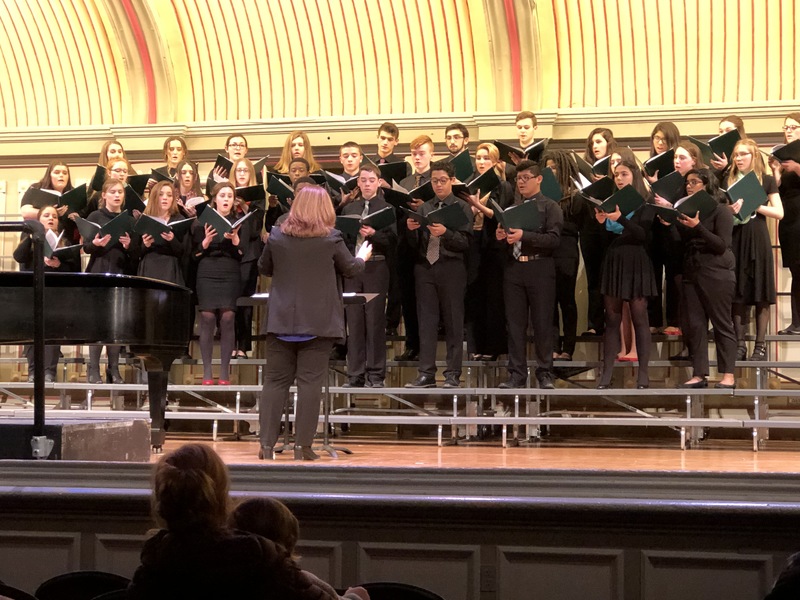For the 2021-22 school year, the district is continuing to roll out its ‘Feature-A-Teacher’ series. This important series highlights the efforts of teachers as they continue to inspire, collaborate and provide the necessary outreach to keep our students engaged and learning. For our kick-off article for the 2021-22 school year, we are highlighting K-12 Art and Music Curriculum Content Specialist and High School Choral Director Michelle McLoughlin. She has been a music teacher in the district for 20 years. In that time, she has elevated the music program, and in doing so, has created a love for music for a generation of RCS students.
Today’s Q&A delves deep into Ms. McLoughlin’s ability to reach her students with instruction, passion and a developed sense of interest for the musical arts.
How does music impact today’s school curriculum?
We are so fortunate at RCS to have such strong music classes and ensembles at all levels, taught by highly trained teachers and professional musicians, in which all students are able to participate. We are also regularly working on improving and expanding the music opportunities we offer to provide everyone, from our beginners to our most advanced student musicians, with the vast benefits of music education. I am grateful to be able to work with all departments and administrators to support our program and integrate what we can offer into the overall district curriculums and goals.
As a fan of music, how do you feel it contributes to a student’s overall ability to become well-rounded as a student?
Musical study is an integral part of a well-rounded education. The skills learned in music classes and ensembles positively contribute to all aspects of the whole student, such as improved test scores, physical coordination, memorization, discipline, social skills and this participation provides a sense of family. There is a well known quote as to why we teach music attributed to an unknown author that I think best answers this question and very loosely states, Music is a Science, Music is Mathematical, Music is a Foreign Language, Music is History, Music is Physical Education, Music develops insight and demands research, but most of all, Music is Art. We don’t teach it to ensure you major in music, but so you will have more life.
What’s your favorite memory teaching at RCS? Who inspires you on a day-to-day basis?
I have SO many special memories of concerts, festivals, musical productions, student milestones and recognitions and being awarded the NAMM Best Communities for Music Education. But if I have to pick just one, my favorite memory is the moment we learned that after a long process, our music program was accepted to be part of the Suburban Scholastic Council for Music. I knew this would bring amazing opportunities for our students to participate in their outstanding festivals. This was also a formal recognition of the incredible support our music program has from the entire RCS community and as a result, we can compete with programs much larger than ours. I am now its Vice President and thrilled to work more closely with my music counterparts at the member schools and in turn, help to continue to grow our RCS music program.
I am regularly inspired by all of my students and colleagues, past and present. My family has always supported my lifelong pursuit of music. I have had a long line of wonderful teachers, whose guidance helped me to follow this path to being at RCS, with a special thank you to Mr. Corigliano, my 7th grade Band Director, who is the reason I decided to pursue music as a career. (If you know me well, you know that my true day to day inspiration is Captain Olivia Benson!)
Finally, how does music change your students’ lives for the better? Not in the classroom, but in their lives post-RCS?
Although there are so many benefits of music education and listening to music in general, far reaching beyond the music classroom, I think what is most beneficial to our students during their time at RCS, is the sense of community that develops from creating music together no matter what path you pursue post HS. Music is an emotional support, a creative outlet, it taps into skills required in every field, and it brings joy to the performer and the listener. Especially during the height of the pandemic, the arts are what kept us going, even in the darkest of times, and I hope that all of my students continue to stay involved in music no matter where life takes them.


